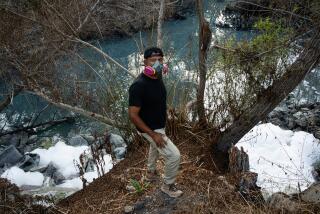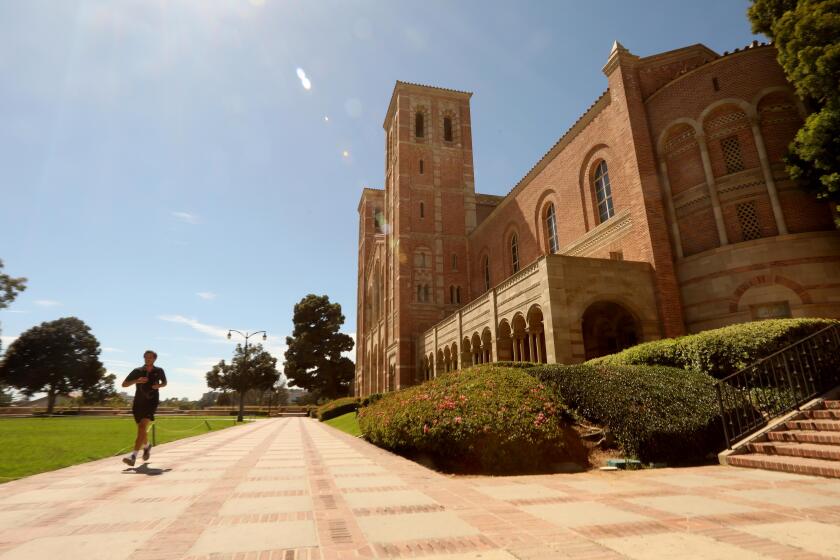L.A. Unified sues over contamination at new Glassell Park campus
Los Angeles Mayor Antonio Villaraigosa has been a constant salesman on the topic of public schools, pushing for reforms, helping elect new school board members and raising millions of dollars for local campuses.
But those efforts didnât stop school board members, including some who were elected with the mayorâs help, from taking City Hall to court over a contaminated campus in Glassell Park.
The Los Angeles Unified School District filed the federal lawsuit earlier this year, alleging that solvents and other hazardous substances at an empty city-owned lot seeped into the soil at a 2,295-seat high school being built next to the Los Angeles River.
The case presents the latest twist in the history of the $239-million project in the Taylor Yard area northeast of downtown.
In 2005, when school officials were negotiating to buy the property, a real estate developer swooped in and purchased it. That led to a lawsuit that ended when the district paid Meruelo Maddux Properties, headed by developer Richard Meruelo, a settlement of $50 million, considerably more than he had paid for the site.
With the school now only months from opening, the district is calling on the city to hand over $4 million, the amount it spent to remove contaminated soil from the campus.
L.A. Unified lawyer Michelle Meghrouni said the school board voted 5 to 0 to bring the lawsuit, which was designed to get the cityâs attention after negotiations stalled. âItâs in their court now,â she said.
Lawyers with City Atty. Carmen Trutanichâs office contend that the city has no responsibility for the districtâs cleanup. Just the fact that the lawsuit was filed drew the ire of City Councilman Ed Reyes, who represents the Glassell Park neighborhood where the school is being built.
Reyes said the two sides should have resolved their issues without having to retain expensive lawyers, some of whom are being paid $330 an hour by the district.
âIâm disappointed because we should be working together. Weâre serving the same constituents,â he said. âI feel like Iâm being blindsided.â
Villaraigosa, who made his partnership with L.A. Unified the centerpiece of his recent State of the City speech, said he hoped the two sides could resolve the dispute. His spokeswoman, Sarah Hamilton, said the mayor received a memo on the lawsuit in January but would not comment further.
With 85 classrooms, the new school building â known as Central Region High School No. 13 â is going up on a stretch of the L.A. River that, for decades, was lined with rail yards, warehouses and manufacturing plants. Reyes, among others, has been working to replace some of those industrial buildings with playing fields and parkland.
L.A. Unified officials identified the spot for a school in 2004, just as the district was in the throes of a $20-billion construction boom. District officials favored the site, in part because it would keep them from having to force out a large number residents and businesses.
Although L.A. Unified had finalized a purchase agreement to pay the seller more than $27 million, Meruelo tied up the property and bought it for $31.8 million.
Stung by its failure to get the land, the school board filed an eminent domain lawsuit, forcing Meruelo to give up the property and sparking a long back-and-forth over the siteâs worth.
At that time, Meruelo was known as the largest landowner in downtown Los Angeles, a businessman who had spent nearly $200,000 to help Villaraigosa win the 2005 mayorâs race.
Two years later, Villaraigosa succeeded in electing a trio of allies to the school board. In 2008, a majority of that board settled its lawsuit by paying Meruelo $18.3 million more for the site than he had spent on it three years earlier.
The only Villaraigosa ally to oppose the settlement was board member Tamar Galatzan, who won office with $2.2 million in support from the mayor. Galatzan called the purchase âa sweetheart deal for the developerâ and said the district should have taken its eminent domain lawsuit to trial.
âI thought we should litigate it and we would win. The price was so far over any estimate for what the property was worth that I thought it was obscene,â said Galatzan, who said she is not involved in the latest lawsuit because she works in the city attorneyâs office.
Even with Merueloâs land, the school site has an odd layout. A privately owned billboard sits in front of the campus on San Fernando Road on property the district didnât buy. Also in front of the campus is a city-owned yard that is used to hold construction equipment during sewer repairs, Reyes said.
In 2009, the same year that Meruelo Maddux filed for bankruptcy protection against its creditors, the districtâs lawyers found contaminants on one end of the campus. They concluded that the chemicals had come from a site once occupied by the Profile Plastics manufacturing plant. That site was purchased by the city in 2001 and belongs to the Bureau of Sanitation, according to city officials.
William Carter, Trutanichâs chief deputy, said the city cleaned up its property in 2005. And he disagreed with the notion that the city has responsibility for the districtâs remediation work.
âItâs obvious that L.A. Unified understood they were purchasing contaminated property â not to say that it was contaminated by our property,â he said.
Carter has some familiarity with soil contamination. From 2006 to 2009, he worked for the law firm that helped the district file its case against the city. As a lawyer in that firm, Carter helped L.A. Unified secure compensation from private companies for the cleanup of polluted soil on its newly bought land.
More to Read
Sign up for Essential California
The most important California stories and recommendations in your inbox every morning.
You may occasionally receive promotional content from the Los Angeles Times.











